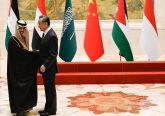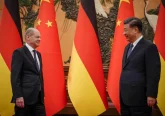 In the New Hampshire debate, Mitt Romney trumpeted his willingness to engage China in a trade war. Romney’s longstanding efforts to paint himself as someone willing to stand up to China exemplify an alarming trend of China-bashing in U.S. politics. Rick Santorum, among others, has echoed Romney, declaring, “I want to beat China.” Such statements are primarily targeted at shoring up political support and secondarily at painting President Obama as being soft on China. We should not take them as an accurate indication of future policy. And despite this overriding political calculus, these remarks are on to something – Beijing’s currency manipulation gives China a competitive advantage in global trade, and its abuse of intellectual property rights ought to be condemned.
In the New Hampshire debate, Mitt Romney trumpeted his willingness to engage China in a trade war. Romney’s longstanding efforts to paint himself as someone willing to stand up to China exemplify an alarming trend of China-bashing in U.S. politics. Rick Santorum, among others, has echoed Romney, declaring, “I want to beat China.” Such statements are primarily targeted at shoring up political support and secondarily at painting President Obama as being soft on China. We should not take them as an accurate indication of future policy. And despite this overriding political calculus, these remarks are on to something – Beijing’s currency manipulation gives China a competitive advantage in global trade, and its abuse of intellectual property rights ought to be condemned.
Furthermore, the frustration expressed over China’s rise occurs in the background of a transition towards an international system less dominated by Washington’s will. It is understandable that U.S. politicians of all stripes vie to be seen as the one most capable of clipping the wings of their country’s preeminent challenger – China. Yet such anti-China grandstanding must not be confused for long-term strategic thinking. In fact, it is rather symptomatic of a larger problem in American political culture – a confrontational approach towards rising powers and the desire, expressed by both President Obama and the Republican candidates, to keep America stronger than all the rest. This displays an ignorance of America’s rise to global power that could harm its future prosperity.
America’s future place in the world depends upon its leaders accepting that being first among equals is not a sign of decline but rather a natural reorientation of global power shaped by a long historical process. The American President must fashion a grand strategy grounded in an appreciation of American history and focused on building diplomatic, economic and military relationships with emerging countries in Asia. The shortsightedness of the recent China-bashing exhibited in both the Republican Primary debates and the President’s State of the Union Address exemplifies Washington’s current lack of grand strategy and historical awareness.
The United States was the only major industrial power to survive World War II unscathed. In 1945, Western Europe and Japan lay in rubble. India was destined to celebrate her independence in 1947 with a brutal partition and war. In 1949, China was reunified by the Communists, but its mid-century experience of the Cultural Revolution and the Great Leap Forward proved to be a great leap nowhere, and it was not until Deng Xiaoping and Manmohan Singh initiated liberal reforms in the late 1970s and 1990s respectively that China and India began growing significantly. Other currently rising powers, such as Brazil, were also non-factors for much of the century.
The increasing economic strength of the BRIC countries and other developing nations, then, is not only a very recent phenomenon – it is also a natural one. Given their ancient civilizations and immense populations, as well as their economic and political vitality for much of human history, it is to be expected that other countries, particularly in South and East Asia, will continue to gain economic, military and political influence, gradually reorienting the global center of power that has been disproportionately skewed towards the West for five centuries.
The decline in America’s percentage of world manufacturing output from 35% in 1945 to just 20% now must be seen in this context, not simply as the result of Chinese machinations. U.S. politicians and the general public must realize that America’s position of global dominance, both alongside the USSR during the Cold War and as the sole superpower between 1991 and 2008, was partly the legacy of the world wars, decolonization and socialist and protectionist economic policies throughout the rest of the world. Grounded in this appreciation of the past, America must look towards the future.
Diplomatically, rather than issuing empty rhetorical threats, the U.S. must engage with China, including its private sector, much of which desires stronger legislation firming up intellectual property rights, as US Ambassador to China, Gary Locke, recently remarked. Economically, American politicians and entrepreneurs must see emerging markets as providing opportunities for export, not stealing jobs that, however sadly, are not going to return. It can do this by following the German example of emphasizing high tech exports and gearing educational institutions towards imparting these skills. In education, generally, funding must be increased for teaching the languages, history and cultures of Asia. Militarily, sensible cuts to outdated commitments in Europe must be paired with creating an increased presence in the Pacific.
This approach must be unified under a philosophy of seeing emerging powers as legitimate long-term competitors, not momentary rivals. Dean Acheson once famously quipped following the Second World War, that Britain had “lost an empire, and has not yet found a role.” In retrospect, America has lacked a sense of her role in the world since 1991. Today she must fashion a pragmatic world strategy that increasingly engages with the world’s emerging economies, not one that retreats from the international stage as Ron Paul suggests, or provokes a counterproductive confrontation with China.
This article was co-authored by Jason Pack and Brant Moscovitch and was first published on 7 February 2012 in The Australian.
Brant Moscovitch researches global history at Oxford University. Jason Pack is a historian at Cambridge University and President of Libya-Analysis.com








No Comment